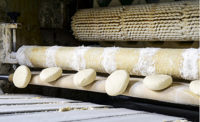Off the Grid
Today’s processors can choose from an assortment of energy-efficient solar roofing systems that provide over-the-top functionalities.

Photo courtesy of Agriculture Energies. Agriculture Energies’ tracking system follows the sun and increases the production of the solar panels by more than 25%.

Photo courtesy of Solar Shield, Inc. To reduce energy consumption during the hot summer months, Solar Shield developed an evaporative roof cooling system.

Photo courtesy of SolarWorld Americas. SolarWorld Americas introduced Sunmodule Protect glass-glass solar panels, an alternative to conventional polymer-based backsheets.



What goes up must come down, right? Well, not necessarily, especially when it comes to energy costs. Thankfully, today’s refrigerated and frozen food processors can choose from an assortment of energy-efficient solar roofing systems that are off the grid.
To reduce energy consumption during the hot summer months, Solar Shield, Inc., Blythewood, S.C., developed a Solar Shield evaporative roof cooling system. Designed to intermittently spray a fine mist of water onto the roof, the water evaporates, carrying with it more than 8,000 BTUs of heat per gallon.
“The best feature of our systems is that they are completely automated,” says John Strait III, product specialist. “They can be programmed to operate during certain times of day or days of the week. Every system control scheme comes with a programmable thermostat. This component ensures that the system only operates when complete evaporation can take place. The thermostat prevents the indiscriminate use of water and keeps it from ‘pooling’ on the roof, or being a nuisance in the dock area parking lot.”
Other benefits include extended roof life by reducing the effect of “cycling,” can use recycled water if available and provides up to 50% reduction A/C load.
“The biggest challenge we face in designing and installing evaporative cooling systems is that no two roofs are exactly alike. Each one has a unique set of circumstances that have to be accounted for (roof material, pitch, HVAC and ventilation units, etc.),” says Strait. “In the refrigerated/frozen food industry, by far the biggest benefit of an evaporative roof cooling system comes in the form of a reduced HVAC/refrigeration cooling load. Nearly 50% of the heat inside a structure emanates from its roof. Therefore, using evaporation to prevent the roof from warming up reduces the amount of heat that must be removed to maintain proper refrigeration temperatures. The result is HVAC/refrigeration units that cycle less often and for a shorter duration, thus consuming up to 30% less electricity.”
Because processing facilities, distribution centers and cold storage warehouses aren’t the only locales in need of some energy efficiency, Solar Shield also created an Evaporative Truck Spray System for semi-trailer trucks.
During the hot summer months, temperatures inside the trailers can reach in excess of 130°F, says Strait. The Solar Shield Evaporative Truck Spray System periodically sprays the trailer’s roof with a thin film of water, then harnesses the natural process of evaporation to carry away heat, thus preventing the roof from reaching extreme temperature levels.
Meanwhile, Agriculture Energies (formerly known as Agriculture Solar) offers non-penetrative rooftop systems that fix and track the sun.
“Agriculture Solar tracking systems allow us to show customers how they can go solar with no upfront capital outlay, see immediate savings in year one and gain long-term control of their energy prices,” says Chuck Helmke, senior systems designer for the Tucson, Ariz., company.
For example, the tracking system follows the sun and increases the production of the solar panels by more than 25% at half the cost. Customers can also choose from a retro-fit system that uses the current beam structure and can withstand 100-plus-mile-per-hour winds and tennis ball-sized hail storms.
“Our Agriculture Solar tracking systems were designed rugged for a wide range of agribusinesses with high energy demands and very limited real estate footprint such as growers, processors, packers, shippers, produce retailers, foodservice distributors, fresh-cut processors, wholesale produce distributors and allied product and service providers,” says Helmke. “They all have lowered their operating costs from day one, and are improving their bottom line with efficiency upgrades and independent energy generation, which offsets a large percentage of their ‘expensive’ peak-hour electricity costs.”
For its part, SolarWorld Americas, Camarillo, Calif., introduced Sunmodule Protect glass-glass solar panels, an alternative to conventional polymer-based backsheets.
“This lightweight, all-glass panel is the next evolution in panel design and has the best performance guarantee in the industry,” says Pete DeNapoli, national account manager. “SolarWorld offers an industry-leading, high-performance 270-watt panel, which is an important distinction for customers who want to maximize power production in a space-constrained environment like a commercial rooftop.”
Sunmodule Protect solar panels are guaranteed to provide 86.85% of their nameplate performance after 30 years of operation. With an annual reduction in power protection of just 0.35 percentage points, the product’s energy-yield-over-service-life ratio substantially exceeds that of conventional glass-film panels. Even with a second pane of glass, Sunmodule Protect solar panels remain lightweight—at about 46 pounds, comparable to glass-film panels—and work with all mounting systems approved for use with the Sunmodule Plus product line.
“Commercial customers, like refrigerated and frozen food processors, represent a growing segment of the U.S. solar market,” DeNapoli says. “These customers seek us out because they demand a solar panel that can reliably produce a guaranteed amount of clean energy over a 25- to 30-year period and a full solution that reduces utility bills and operating costs now and for years to come.”
Helpful Hints
What are some things refrigerated and frozen food producers need to keep in mind when selecting and installing solar roofing systems?
1. Not all solar is created equal. The Silicon Valley Toxics Coalition, a watchdog organization for the solar industry, releases a yearly Solar Scorecard, a report that compares solar companies on criteria such as solar panel recycling, supply chain monitoring, chemical use, life-cycle analysis and reporting. “With so many new entrants into the solar industry manufacturing panels around the globe, it is more important than ever for customers to be confident that their system is built to last,” says Pete DeNapoli, national account manager for SolarWorld Americas, Camarillo, Calif.
2. Not all warranties are created equal. These days, almost all solar manufacturers offer warranties, but don’t assume that they’re all the same. “Warranties can be divided into a workmanship and a performance warranty,” says Seth Pepper, principal for Agriculture Energies, Tucson, Ariz. “That performance warranty of 25 years is a long-term commitment from the manufacturer. Please take into consideration how long they’ve been in business.”
3. Not all roofs are created equal. Work with a company who is willing to design, install and help maintain the roof cooling system to pre-determined specifications. “I strongly caution against purchasing an evaporative roof cooling ‘kit,’” says John Strait III, product specialist for Solar Shield, Inc., Blythewood, S.C. “Each roof has its own special nuances that need to be addressed prior to any installation. Working with an organization that has an extensive background in dealing with those intricacies provides the best chance for developing the most efficient system possible.”
Looking for a reprint of this article?
From high-res PDFs to custom plaques, order your copy today!













